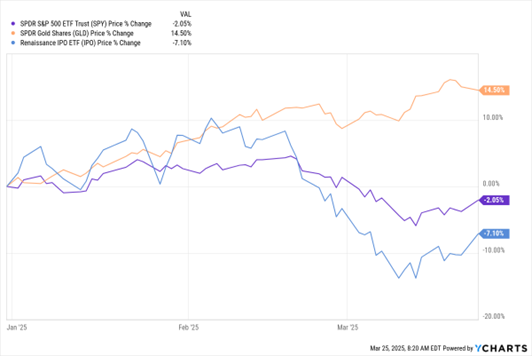Stocks surged yesterday, and they’re climbing a bit more in the early going today. Gold and silver are modestly higher along with crude oil. Treasuries are trading slightly lower at the long end of the curve, while the dollar is dipping.
Optimism about potential tariff delays and/or rollbacks helped fuel yesterday’s gains. But will they hold? It’s worth noting that in addition to sectoral and reciprocal tariffs, investors now have a new category of levy to worry about: “Secondary” tariffs. President Trump warned yesterday that the US could slap 25% tariffs on countries that purchase Venezuelan oil and gas.
SPY, GLD, IPO (YTD % Change)
Data by YCharts
That essentially makes them second-derivative levies, akin to secondary sanctions which are sometimes applied to countries or individuals that do business with countries under primary sanctions. China is one of the big purchasers of Venezuelan energy products on the black market, so it could face yet another US charge.
Meanwhile, gold is FINALLY getting some love from Main Street. Throughout its multi-month rally, gold hasn’t attracted the kind of big inflows (via the ETF market) that other asset classes like cryptocurrencies have. But in the most recent week, ETFs snapped up 23 tons of gold according to Bloomberg – the most in any single day since 2022. Bullion recently surged to an all-time high above $3,060 an ounce, and it has been consolidating those gains since.
Initial Public Offering (IPO) activity has slumped globally due to rising policy uncertainty and volatility in markets. The Renaissance IPO ETF (IPO), for its part, has shed 7% so far this year. But select marketplaces are trying to make it easier for investors to buy shares in PRIVATE companies – a strategy traditionally reserved for high-net-worth individuals and institutions.
EquityZen and Forge Global Holdings Inc. (FRGE) have inked a deal with Yahoo Finance to allow private-stock trading for individuals who have as little as $5,000 to invest. Participants pay higher commissions, get shares with less liquidity, and typically face lockup restrictions. But the marketplace gives company insiders a way to cash in on private share gains, while giving outsiders the chance to target larger potential profits by investing in pre-IPO companies.










